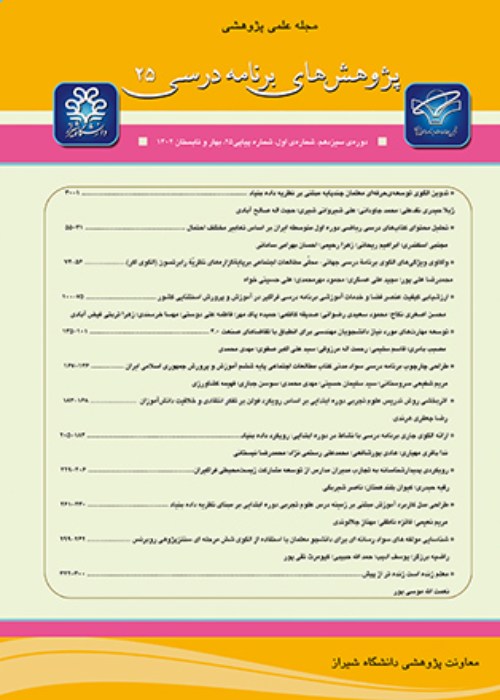Challenges and Opportunities in the Educational System from the Perspective of Elementary School Teachers in Marvdasht, Fars Province, During the Covid-19 Pandemic: A Mixed-Method Research
Current educational approaches are changing in response to the challenges following the Covid-19 pandemic. These changes are intended to improve the efficiency of the education system in preventing and dealing with global threats and crises, such as the one caused by the Covid pandemic. Covid-19 posed a serious challenge to the economy, culture, education, sports, etc. and had a profound effect on people’s lives all around the world. In Iran, as in other parts of the world, the pandemic led to the closure of schools and universities. This massive disruption in education, particularly higher education, brought to the fore the issue of e-learning and online education. In 2005, online methods were introduced by UNESCO as the most effective teaching-learning methods. The experiences gained in this regard since 2005 are very useful. It seems that the education system can no longer rely exclusively on the previous models of teaching and learning. Thus, it must undergo structural changes and make virtual learning available to more and more students. Following the global outbreak of Covid-19, the need for virtual and e-learning is felt more than ever. Lane (2009) believed that virtual education, as opposed to traditional education, could present major challenges for teachers and students trained and taught in the traditional way. In other words, without technical and educational support, e-learning and teaching cannot welcome to its fruition. On the other hand, Anas (2020) argued that traditional education had positive social aspects that virtual education did not enjoy. Also, research has shown that virtual teaching causes some problems for teachers and educational centers (Maggio, Daley, Pratt, & Torre, 2018). However, there are opportunities to mitigate the potential negative effects of elearning, and teachers are expected to play a key role in creating these opportunities. Despite the importance of virtual education during the Covid-19 pandemic, limited research has been done on the use of information technology in virtual education in Iran. Therefore, this study aimed to explore teachers’ perspectives regarding the following questions: The challenges teachers faced with virtual education during the Covid-19 pandemic, any constraints that they noticed in the education system, what opportunities teachers thought e-learning created in the education system during the Covid-19 pandemic, and, finally, to what extent teachers approved or disapproved the challenges and opportunities that were created in the aftermath of the Covid-19 pandemic. The present study adopted an exploratory sequential mixed-methods design. In the qualitative part, the upstream documents and past research were examined and semi-structured interviews were conducted. In the quantitative part, a researcher-made questionnaire based on the analysis of documents and interviews was used. The analysis of the interviews in the qualitative section led to the identification of 55 open codes (items) and10 codes in the axial and selected coding stages. Based on the elementary school teachers’ views in Marvdasht, the challenges that emerged within the educational system during the Covid-19 pandemic can be classified into three levels: macro, middle, and micro. Challenges at the macro level included the lack of strategic thinking, inefficient policymaking, limited educational technology, and inefficient management. At the middle level, the challenges were the weakness of the introduced technology, the lack of independence and freedom of action, and increased budget disruption. At the micro level, the challenges concerned teachers, students, and families. In the quantitative section, a high percentage of agreement showed that teachers in the quantitative section agreed with their peers in the qualitative section with regard to what they considered as challenges. In addition, according to the participant teachers, the opportunities created in the education system during the outbreak of Covid-19 can be classified into three levels. Opportunities at the macro level included providing the ground for change, paying attention to strategic planning, and giving special heed to virtual training. At the middle level, the opportunities consisted of providing equal educational opportunities andpromoting educational innovation. At the micro level, opportunities were related to teachers, students, and families. Overall, it can be said that in the beginning, e-learning in Iran faced some challenges in terms of design and implementation due to the lack of necessary coordination and logistics. However, the provision of free internet packages by the government to teachers and students, special educational programs on television, and electronic training packages in the form of flash memory and compact discs for students in remote and deprived areas of the internet reduced the problems. Gradually, as students became more familiar with the “Happy Network Platform” (the virtual education application and system used by schools in Iran), their participation in classroom activities increased, they made more noticeable progress, and, ultimately, the quality of instruction improved. Therefore, irrespective of the advantages and potential disadvantages of virtual education, its importance and necessity cannot be denied in our era
- حق عضویت دریافتی صرف حمایت از نشریات عضو و نگهداری، تکمیل و توسعه مگیران میشود.
- پرداخت حق اشتراک و دانلود مقالات اجازه بازنشر آن در سایر رسانههای چاپی و دیجیتال را به کاربر نمیدهد.



